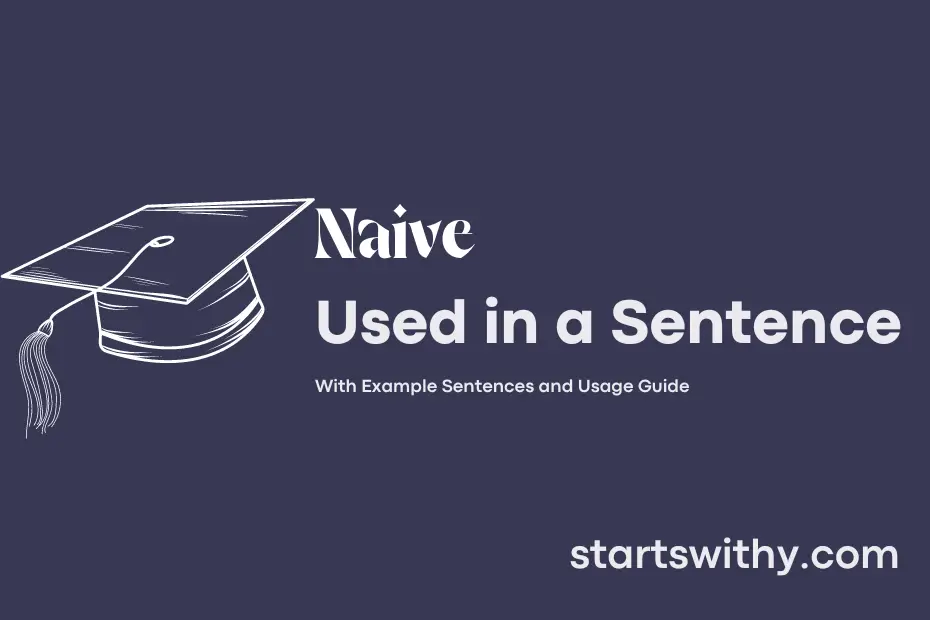Have you ever been accused of being naive? Being naive means lacking experience, wisdom, or judgment, often resulting in trust and optimism that can be seen as overly simplistic or unrealistic.
When someone is described as naive, it usually implies that they believe things easily and are easily fooled due to their innocence or lack of understanding. It can also suggest a lack of skepticism or critical thinking in certain situations.
7 Examples Of Naive Used In a Sentence For Kids
- Naive means someone who is innocent and lacks experience.
- It’s okay to be naive because we all learn new things every day.
- Sometimes being naive can be a good thing, it means you have a pure heart.
- If you feel confused, don’t worry, it’s normal to feel naive sometimes.
- Being naive can help us see the world with wonder and curiosity.
- Remember, it’s important to be kind to someone who is naive.
- Everyone starts off a little naive, but as we grow, we learn and become wiser.
14 Sentences with Naive Examples
- Naive students often struggle to navigate the complexities of academic life in college.
- It’s important not to be too naive when choosing a major that will impact your future career.
- Many college students start off naive about the importance of networking and building connections in their field.
- Being naive about financial management can lead to unnecessary debt during your college years.
- It’s common for naive students to fall for scams targeting college students, such as fake internships or study abroad programs.
- Some students are naive about the importance of mental health and self-care during the stressful college years.
- Naive students may underestimate the amount of time and effort required for rigorous coursework in college.
- It’s easy to be naive about the impact of social media on your academic performance and mental well-being in college.
- Naive students may overlook the value of extracurricular activities in building a well-rounded college experience.
- It’s crucial for naive students to seek guidance from academic advisors and mentors to make informed decisions about their education.
- Naive students may be easily swayed by peer pressure to engage in risky behavior, such as substance abuse, in college.
- Being naive about plagiarism and academic integrity can have serious consequences for college students.
- Naive students may struggle to adapt to the independence and responsibility of college life.
- It’s important for naive students to be proactive in seeking help and resources to ensure their success in college.
How To Use Naive in Sentences?
To use the word “naive” in a sentence, it is important to understand its meaning and proper context.
-
Definition: “Naive” is an adjective that describes a person who lacks experience and is easily fooled or lacks sophistication and worldly wisdom.
-
Example: “She was so naive that she believed everything she was told.”
-
Usage: When using “naive” in a sentence, it is essential to consider the situation where someone’s lack of knowledge or experience is evident.
-
Synonyms: Other words that can be used interchangeably with “naive” include innocent, gullible, credulous, trusting, and unsophisticated.
-
Tip: To make your sentence stronger, try to provide context or details that highlight the person’s innocence or lack of awareness.
-
Caution: Do not use “naive” in a derogatory manner as it can be seen as rude or offensive.
-
Practice: Think of scenarios where someone’s naive nature could be displayed, such as believing in improbable promises or falling for obvious tricks.
Remember, using the word “naive” effectively in a sentence involves understanding its meaning and applying it appropriately to describe someone’s lack of experience or wisdom in a given situation.
Conclusion
In various sentences containing the term ‘naive,’ individuals are described as having a lack of experience, judgment, or understanding of the complexities of a situation. This adjective is often used to point out someone’s innocence or gullibility. For example, “She was naive to believe everything she was told without question.”
Overall, it is crucial to be cautious about being too naive in a world filled with diverse perspectives and potential deceit. While innocence can be endearing, it is essential to balance trust with critical thinking to navigate through life’s challenges effectively.



